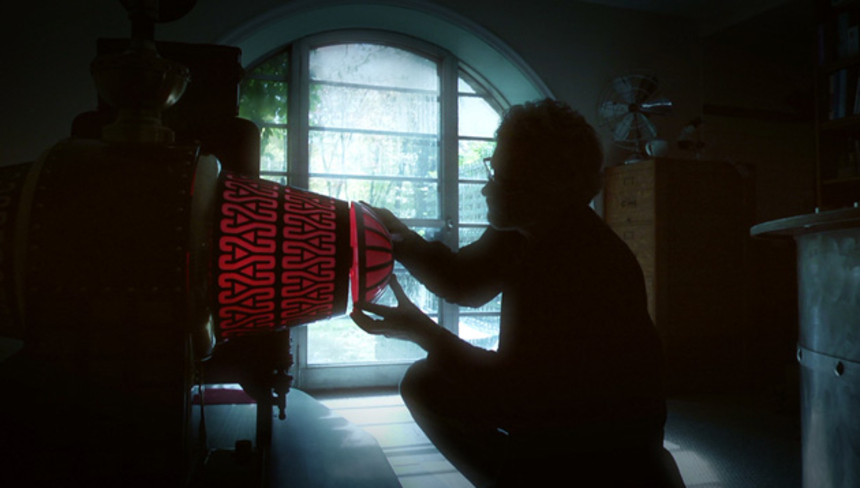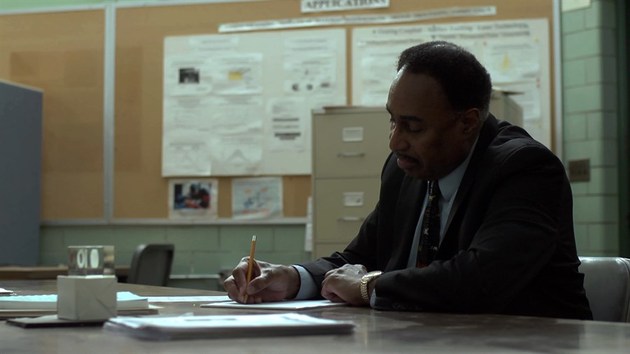Hot Docs 2016 Review: HOW TO BUILD A TIME MACHINE Beautifully Mixes Craft And Emotion

The famous Serenity Prayer of american theologian Reinhold Niebuhr is as follows: "God grant me the serenity to accept the things I cannot change, the courage to change the things I can, and the wisdom to know the difference." Jay Cheel's beautifully rendered How To Build A Time Machine tells the stories of two men who are on the verge of that wisdom, and in the act of telling, examines line between our boundless imagination and the rigorous nuts and bolts of acquiring the knowledge required to achieve some measure of it.
Shot over five years, the film follows former Pee Wee's Playhouse animator Rob Niosi who has been building a replica prop of the time machine from George Pal's 1960 film adaptation of H.G. Well's The Time Machine. What started as a fun 3 month project has, through is own peculiar, yet charming, Sisyphean nature, has blown out to nearly a decade. This is a peak into the psyche of a stop-motion animator whose entire working day might yield only seconds of usuable film.
Rob's father took him (and his brother) to see The Time Machine when he was a little boy, where they both became fascinated with the central machine. His father was instrumental in his son moving toward a career in animation, providing tools and encouragement and advice along the way. Implicit in Niosi's recreationf of the time machine is to recapture the pure impression he had of that perfect day at the cinema with his family.
The film juxtaposes magnificent montages of Niosi meticulously crafting each brass or mahogany part for the prop replicate together with the academics of Dr. Ronald Mallett, a physicist at the University of Connecticut whose scientific career has been a pursuit of the hard science of time travel.
Significant is the muse that drives these men, completely different relationships with their respective fathers, which gives the movie a surprising emotional resonance. If father-son stuff affects you as much as it does me, you might want to pack some tissue. Mallett lost his father to a heart attack when he was about the same age that Niosi was in rapture watching Morlocks fighting the Eloi at the movies.
The core motivation of decades of complex theory and practical experimentation is the dream of the possibility to go back and warn his father of his weak heart, and the young boy, who idolized him, that would be left fatherless at such a young age. And yes, Mallett also idolized a comic book version of H.G. Well's science fiction story which he believes put him on the circuitous path to a doctorate degree.
In 2006, Mallett told his story with his autobiography, "The Time Traveler," which Spike Lee optioned to make as a film; Mallett is one of the only black PhD physicists in the United States in the early 1970s. The relationship of Mallett and his father as a boy, and his father's gaping absence as man, is a compelling one. Mallett directly address the camera and in his own words tells the story of his life and his life's work. For a film nerd like myself, who has read Mallett's book, it is notable that his theories of time travel form the basis of Shane Carruth's hard science fiction masterpiece, Primer. You (or, more realistically an isolated sub-atomic particle) can only go so far back in time as when you first turn the machine on, no further.
Masterfully stitching these two narratives together in a way that recalls Errol Morris' Fast Cheap And Out Of Control, Cheel's associations ask many of the big questions of time travel: the grand father paradox, the ethics and social consequences of making changes to (or even being present in) the past, and the desire to know the future. He also delves into the notion that cinema is the best time travel machine we have ever possessed, we can see actors and people that have been dead for decades, we can slow down or speed up time with our photography.
Case in point, we watch five years worth of Cheel's own documentary filmmaking condensed into 82 minutes. More importantly, the movies, book, and comics that we read often provide the fuel for the decades of hard, grinding work (in Niosi's case that is both literal and figurative) to achieve only a fraction of our dreams, and coming to grips the fact that while perfection is impossible, it is the pursuit of it that is the worthy thing.
My favourite scene in the film is Niosi singlehandedly rolling a 10 foot diameter copper-anodized dish up a large hill on his leafy upstate New York estate, so it can bleach a little in the sun to achieve the perfect shade in his mind. The story of Sisyphus and the pursuits of mankind in perfect miniature. A more subtle image of Ron in his teaching office has a small can of WD-40 lubricant just within reach; I like the idea that a theoretical physicist is only a short distance from getting the squeaky wheel into motion.
While Mallett's theories confirm the fact he will never be able, personally, to go back in time to warn his father (and possibly obliterate his own timeline -- again, go see Primer), his life experience yields the wisdom that somewhere out there if his father could witness the man Mallett became as the result, his dad would be beaming. There is a certain serenity in that.

[Full Disclosure: I have 'acted' in one of Jay Cheel's previous films, Colore Non Vedenti, and have been good friends with the director for several years.]
How to Build a Time Machine
Director(s)
- Jay Cheel
Writer(s)
- Jay Cheel
Cast
- Bob Burns
- Donald D. Coleman
- Ronald Mallett
- Robert Niosi







